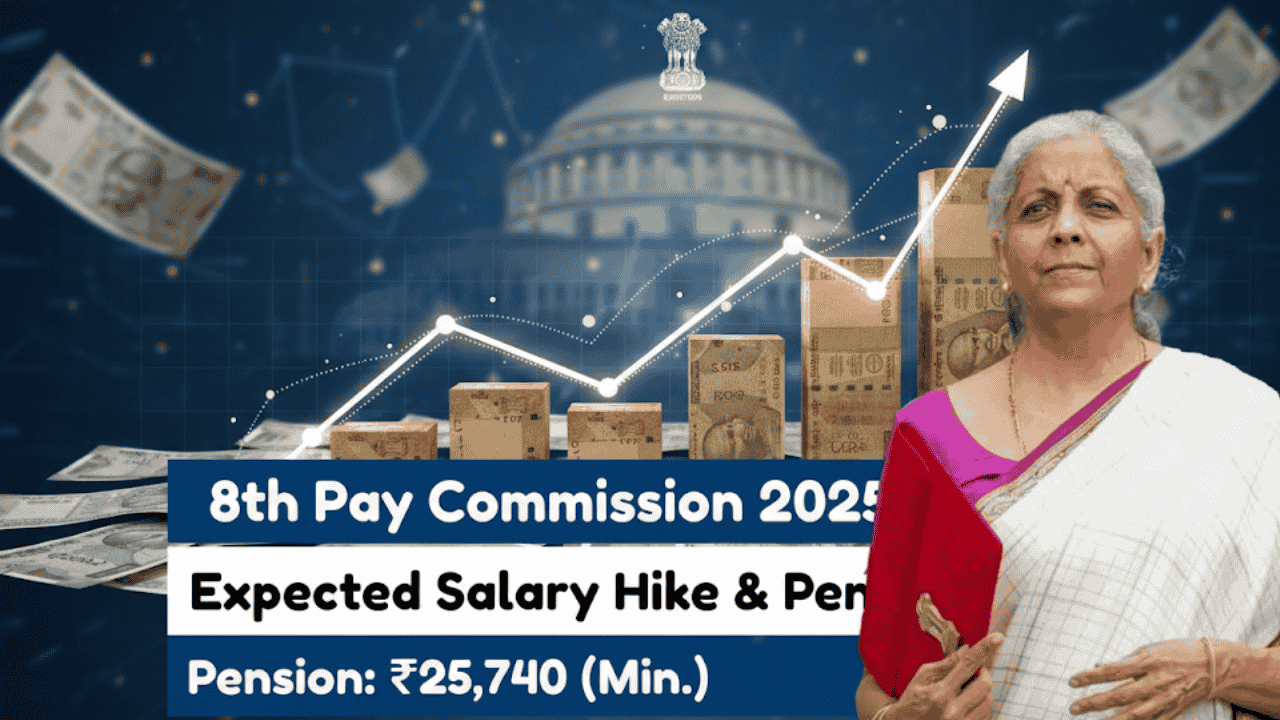The 8th Pay Commission 2025 is set to bring major changes for central government employees and pensioners in India. With rising inflation, changing living costs, and increased financial needs, this commission aims to revise salaries, pensions, and allowances to ensure fair compensation and long-term financial stability. While official notifications are yet to be released, experts and reports provide valuable insights into what employees can expect in the coming months.
What is the 8th Pay Commission?
The Pay Commission is a government-appointed committee tasked with reviewing and recommending changes to the salary structure of central government employees and pensioners. The 8th Pay Commission, following the 7th Pay Commission, is expected to:
- Revise basic pay and pension structures
- Suggest fitment factors for salary adjustments
- Recommend changes in allowances (such as HRA, transport, and medical)
- Ensure salaries remain aligned with inflation and living costs
Expected Salary Revisions
One of the most anticipated outcomes of the 8th Pay Commission is the salary hike for government employees. According to reports, the fitment factor is likely to range between 1.92 and 2.86. This factor determines the increase in basic pay based on current salary structures.
Example
- Current minimum basic pay: ₹18,000
- New minimum basic pay (at fitment factor 2.57): ₹46,260
- New minimum basic pay (at fitment factor 2.86): ₹51,480
Pension Hike for Retirees
Pensioners will also benefit from the commission’s recommendations. Pensions are calculated based on the last drawn salary and the fitment factor applied. With the proposed increases:
- Pensions for central government retirees could rise proportionally, offering improved financial stability.
- Higher pensions will help retirees manage medical expenses, daily costs, and inflation-related challenges more effectively.
Allowances and Benefits
The 8th Pay Commission is also expected to review allowances to ensure they meet current living standards. Key allowances likely to be addressed include:
- House Rent Allowance (HRA): Adjusted based on city tier and inflation
- Transport Allowance: To offset rising fuel costs
- Medical Allowance & Reimbursements: Covering healthcare needs
- Special Duty Allowances: For employees in challenging or high-cost locations
Allowances and Benefits
The 8th Pay Commission is likely to review and revise allowances for employees. Major allowances include:
| Allowance Type | Current Structure | Expected Revision | Notes |
|---|---|---|---|
| House Rent Allowance (HRA) | 8%-24% | Likely increase based on city tier | Helps offset rising rent costs |
| Transport Allowance | Fixed monthly amount | Adjustment based on fuel and inflation | Beneficial for employees in cities |
| Medical Allowance | ₹15,000 per year | Likely higher reimbursement or increased cap | Covers medical expenses for employee and family |
| Special Duty Allowances | Varies | Expected review | For employees in challenging locations |
Implementation Timeline
The official implementation date for the 8th Pay Commission is expected to be January 1, 2026. However, the appointment of members and the final recommendations are still pending. Once implemented, employees and pensioners will start receiving revised salaries and pensions from the effective date.
Quick Salary & Pension Comparison Table
| Category | Current Pay/Pension | Expected Pay/Pension (Fitment 2.57) | Expected Pay/Pension (Fitment 2.86) |
| Minimum Basic Pay | ₹18,000 | ₹46,260 | ₹51,480 |
| Mid-Level Employee Pay | ₹56,100 | ₹1,44,177 | ₹1,60,366 |
| Maximum Basic Pay | ₹2,50,000 | ₹6,42,500 | ₹7,15,000 |
| Pension (Minimum) | ₹15,000 | ₹25,740 | ₹28,200 |
| Pension (Average) | ₹30,000 | ₹51,000 | ₹55,800 |
Impact on Employees and Pensioners
The expected changes from the 8th Pay Commission are significant and far-reaching:
- Financial Security: Higher basic pay and pensions improve overall financial stability
- Purchasing Power: Increased salaries enable employees to cope with rising costs of living
- Retirement Planning: Enhanced pensions provide better post-retirement support
- Motivation & Job Satisfaction: Fair compensation boosts employee morale
Employees in different pay levels can expect varying benefits, with higher impact on those in lower pay bands.
Key Points to Remember
- Fitment Factor Matters: Determines the percentage increase in basic pay and pension
- Allowances Are Likely to Be Adjusted: HRA, transport, and medical allowances may see significant revisions
- Timeline: Recommendations expected to be implemented from January 2026
- Impact: Both current employees and retirees stand to gain financially
Conclusion
The 8th Pay Commission 2025 is an important step toward ensuring fair, equitable, and modern compensation for central government employees and pensioners. While the official notification is awaited, the expected revisions in salaries, pensions, and allowances indicate a positive shift toward financial security and better quality of life.
4. FAQ Section (Rich Snippets / User Value)
Q1: What is the 8th Pay Commission 2025?
A: The 8th Pay Commission is a government-appointed committee tasked with revising the salary structure, pensions, and allowances for central government employees and pensioners. It aims to improve financial security and adjust pay according to current economic conditions.
Q2: When will the 8th Pay Commission recommendations be implemented?
A: The recommendations are expected to be implemented from January 1, 2026, although the official notification and appointment of commission members are still pending.
Q3: How much salary increase is expected under the 8th Pay Commission?
A: Early estimates suggest that the minimum basic pay may rise up to ₹51,480, depending on the fitment factor. Mid-level and higher pay band employees will also see proportional increases.
Q4: Will pensioners benefit from the 8th Pay Commission?
A: Yes, pensions are expected to rise proportionally, with minimum pensions potentially increasing to around ₹25,740 or higher, improving retirees’ financial security.
Q5: Which allowances are likely to be revised?
A: House Rent Allowance (HRA), Transport Allowance, Medical Allowance, and Special Duty Allowances are likely to be updated to align with inflation and living costs.
